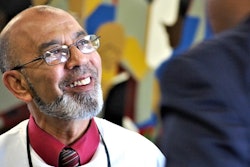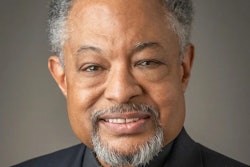Tales of Major Significance
Process doesn’t always make perfect and the final choice is not always the last option.
For Jesse Willard Thompkins III, a Dean’s List freshman at Columbia University in New York, the process of choosing a major is just beginning. And so far, it has been a tumultuous one.
“It already is very stressful,” he says. “I talk to my mom and adviser about it almost weekly.”
The 18-year-old from Washington, D.C., is in the university’s engineering school. But now, he says he wants to explore filmmaking as his choice of major. His parents, on the other hand, are concerned about the family “investment” and insist that he carefully consider his options.
“My mom is advising me to make sure that I become well-acquainted with a field that has a little more [financial] security than film,” says Thompkins, who earns money by taking notes and posting them on the Internet for versity.com. “She is not discouraging following film, but she wants to make sure that with the investment [the family is] making in my education, I can get a job when I graduate.”
For the Thompkins family, there is a very palpable reason for their concerns: A recent upturn in the family’s income made them ineligible for need-based financial aid — and Columbia does not provide athletic or merit scholarships.
Coupled with inattentiveness paid to the financial assistance side of choosing a college, the Thompkinses will end up paying between $23,000 and $32,000 a year for their son’s college education. The younger Jesse did receive some scholarship assistance that was merit-based from sources other than Columbia, but that was only for his first year.
The Thompkinses face a classic dilemma endured by families across the country. With so much at stake, parents are having to ask themselves one very important question when it comes to their children’s choice of a major: To intervene, or not to intervene?
Investing in the Future
“Because the school is so expensive, it goes beyond the standard education,” says Jesse’s mother, Judy Thompkins. “And because of our income, it’s a real stretch. It goes beyond just getting an education to being an investment in the family. For this kind of money, I take it as an investment for the family and an investment for his people.”
She admits sending encouraging signals to her son about a film career.
“It was something I had thought about for him and kind of suggested it at one time,” she confesses. “What we’ve talked about is that he should combine that with something else that will guarantee a good income. Since there is so much computer technology in film these days, he could combine film with computer science or something like that.”
Besides, “I realize that he’s probably too young to make a lasting career choice. But because of the financial impact on the family, I feel I have to insist that he receive some training that will both interest him and make him marketable after college,” she says.
Then there’s Kineta Sealey, a 21-year-old Howard University student who earned a 3.42 grade-point average last fall and expects to graduate this fall. She initially attended the University of Maryland at College Park before transferring to Howard for the Physician’s Assistant Program — which, she says, was not offered at College Park. She chose health management and health sciences as her major.
“As a major in health management, I hope to develop a strong foundation to contribute to shaping the future of health care in this country,” she says.
Sealey says the process was difficult until she pinpointed a career where she could use her dual interests.
“I was a biology major before I made the change to health management/health sciences. I changed majors because I realized that I did not want to become a physician. I asked myself, how could I incorporate my love for business and remain in a health-care setting? The answer was health management and health sciences, [which enabled] me to combine my talents in business and science.”
She also sought advice from a multitude of sources.
“I guess that everyone to some extent had input in advising me of what career path to take,” she says. “My family, my advisers and my friends told me to do some serious self reflection and self exploration. They all stressed that I should think about what my main areas of interest were in conjunction with my academic strengths; and what careers have a profitable business outlook in terms of stability and monetary compensation.”
Sealey’s parents, Joseph and Jacqueline Sealey, were heavily involved in their daughter’s decision.
“You have to leave [college] with a career path and be prepared to do something” to earn a living, says Jacqueline Sealey, who is an artist. “We suggested that Kineta might explore a career in health management because we knew of her business interests. We were worried that with Kineta graduating with a biology degree, not wanting to go to medical school could prove to be problematic.
“While biology is a solid degree,” Jacqueline Sealey explains, “we were concerned that it would predispose her for a career in teaching or research — [things] we knew Kineta was not interested in pursuing. We also knew that after she obtains a health science/health management degree, if she still feels medicine is her calling, then she can always take the appropriate tests and courses necessary to attend medical school. In other words, majoring in health management provided Kineta with some other options.”
That same parental guidance helps direct the college career of Kineta Sealey’s brother. Joseph III — who Jacqueline Sealey says was “open” as to the choice of a major — is currently a sophomore at Howard University with a 4.0 average. He is studying physical therapy, but his parents expect changes along the way.
“We suggested that area of study to him because he also has an interest with health care,” Jacqueline Sealey says. “We said, ‘Let’s start college a with specific area of study in mind, and if you discover a different area of interest, then you can change your major. But start out with some direction.'”
All in the Family
While college can be a family affair for many students, for others the process is relatively easy — pun intended.
Take Shabaki Lambert, who graduated from Williams College, lives in Chicago and is a 24-year-old consultant in the Value Creation Group of Deloitte Consulting LLC. Her work, which involves helping school districts access federal reimbursements, has very little to do with her major, which was political science.
Lambert says she didn’t get any advice on her choice. “I was really the only person involved in the process,” she says.
A native of Brooklyn, N.Y., Lambert is the oldest of six children. Her father, Dennis Lambert, is a contractor and her mother, Desiree Lambert, works at a day-care center. Neither of them attended college, and they made a conscious decision to have no input on their daughter’s choice of a major.
“That is something we don’t do. I don’t tell my kids what I want them to do” with their lives, Desiree Lambert says. “They have to choose that for themselves.”
Shabaki Lambert said it wasn’t an easy decision. “Before I declared (political science), I was also thinking about being an economics major,” she confides. “I knew I wanted to be a businesswoman in the private sector and thought that economics would give me the appropriate background to pursue that career.”
But then she saw that political science could enhance her career opportunities.
“I took an introductory class to international relations and was fascinated by the meeting of history, economics and politics,” she says. “I still wanted to enter the business world, but with my growing interest in international relations, I wanted a career that would allow me to integrate my international relations knowledge and business.
“I began taking more political science classes in international relations, but continued to also take some economics classes. I enjoyed the reading, discussions and the papers in my political science courses because they were so current and the major naturally evolved out of that.”
Shabaki Lambert’s brother, Troy, is currently in the City University of New York system. A 21-year old New York Tech student who will receive his associate’s degree in architectural technology this year, Troy Lambert also set his sights without help from his parents. He plans to continue his studies, working on either a bachelor’s in facilities management or architecture.
“I knew my major from the beginning — in 1997,” says Troy Lambert, who has had to maintain a job while pursuing his education. “I’m looking at working within the field, [but] I took a lot of liberal arts courses to supplement my major. I’m just tightening up my skills for the future.”
But despite picking a major that she expected to use upon graduating from college, Shabaki Lambert finds herself working at something which she had not previously contemplated. She was exposed to the opportunity during an on-campus, recruiting visit.
“A partner at the office is a Williams graduate and he came back [to the college] to interview students,” she says. “The job sounded interesting, so I took it.”
Despite having a job for which she really didn’t prepare, Shabaki Lambert does believe that the choice of a major is important to life after college.
“I still have an interest in politics on an international level. Even though my current job does not have anything to do with my major, I still read [about] the topics that were a part of my major.”
© Copyright 2005 by DiverseEducation.com





















